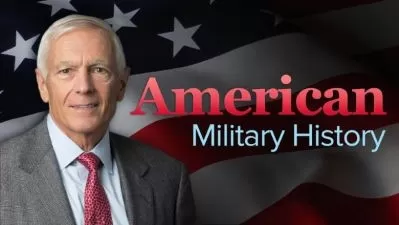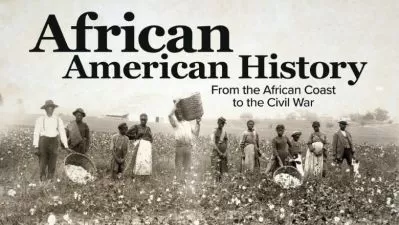American Ideals: Founding a
Daniel N. Robinson
6:08:11
Description
As nations proceed to invent themselves, refine themselves, and render themselves fit for the allegiance of their people, the Constitution of the United States remains the gold standard. For those fortunate to live under a rule of law respectful of the dignity of the person, there is such a feeling of familiarity and naturalness that little attention is paid to the monumental nature of the “invention”—and, therefore, the monumental effort required to preserve it.
As the world’s oldest democracy, the United States stands as the test case for those who regard self-government as inherently unstable, inherently self-destructive. Fears were expressed from the first, but so too was unrelenting resolve. Writing to his beloved Abigail on July 3, 1776, John Adams offered this sober reflection:
“You will think me transported with enthusiasm, but I am not. I am well aware of the toil, and blood, and treasure, that it will cost us to maintain this declaration, and support and defend these States. Yet, through all the gloom, I can see the rays of ravishing light and glory. I can see that the end is more than worth all the means, and that posterity will triumph in that day’s transaction, even although we should rue it, which I trust in God we shall not.”
How to Determine Ideals?
Just which “ideals” were affirmed by the Founders? What lessons of history were closely studied by them? What part did religion take in the entire undertaking and, in light of this, what is the nature of that famous “wall of separation” Jefferson wrote of in his correspondence? How was the institution of slavery understood in relation to the high ideals and aims of the Founders?
This set of a dozen lectures is an invitation to enter this part of the Long Debate; the debate regarding human nature and the conditions right for its flourishing. The lectures are also a tribute to the Founders whose depth of thought, raw courage, persistence, and realism succeeded in moving political philosophy from the schoolhouse to the wider world.
Between the lines of all the lectures there is also a portrait formed of a people striving to preserve and promote lives at once self-determining and consistent with high principles deeply held. Their character was recognized at a great distance.
“This general spirit existing in the American nation is not new among them; it is, and ever has been their established principle, their confirmed persuasion; it is their nature and their doctrine. You might destroy their towns, and cut them off from the superfluities but they prefer poverty with liberty, to golden chains and sordid affluence. ’Tis liberty to liberty engaged, that they will defend themselves, their families and their country. In this great cause they are immovably allied. It is the alliance of God and nature—immutable, eternal, fixed as the firmament of heaven!”
—William Pitt, in the House of Lords, December 20, 1775
The Right People for a Republic
Montesquieu’s widely read Spirit of the Laws described the civic personality that is right for a given form of government. Tyrannies required citizens motivated and guided by fear. The worthy monarchy depends on subjects devoted to honor. A self-governing republic calls for those committed to virtue. But what are the sources of virtue, and to what extent were they effective in shaping the character of Colonial America?
Early America was settled by devout Puritan Christians whose successors were attached to the same Christian teachings, now adapted to a New World, rapidly expanding in population and in commerce. It was, however, less the land of “rugged individualism” than of a principled communitarianism focused on the common good. It was precisely this combination of piety and sober deliberation—this immunity to fashionable and abstract philosophies—that preserved it from the excesses that consumed revolutionary France. The humanistic Calvinism that guided so many colonial lives was further enlarged by trust in the common sense and rationality shared by all; a common sense and rationality that would stand as the ultimate arbiter over the claims of authority.
The colonists, we discover, were avid readers. In a 1775 speech before Parliament, Edmund Burke pointed out that London booksellers had informed him that they sold more books in the colonies than in all of Great Britain combined. Montesquieu, John Locke’s Treatises on Government, and John Milton on press freedoms—these and scores of works in moral philosophy, history, law, and theology were staples even in the smallest private libraries.
In these carefully crafted dozen lectures, Professor Robinson traces the dominant features of the early American ethos that culminated in declared independence and a constitutional form of government unheralded in political history. The United States of America was, after all, the first nation ever to be created on a date certain by persons whose names we know and on grounds developed through debate and deliberation. As the influential Founder, James Wilson, said during the ratification process,
“The United States exhibit to the world the first instance, as far as we can learn, of a nation, unattacked by external force, unconvulsed by domestick insurrections, assembling voluntarily, deliberating fully, and deciding calmly, concerning thatsystem of government, under which they would wish that they and their posterity should live.”
The Founding Documents
Here, then, is an opportunity to trace the way the founding documents of the United States evolved. You examine the early Articles of Confederation as these anticipate the fuller development of fundamental principles during the Constitutional Convention. Notions embodied in earlier colonial laws evolve and are made enduring in the Declaration of Independence and the Constitution. George Mason’s Virginia Declaration of Rights, for example, asserts that “All men are by nature equally free and independent, and have certain rights,” including “pursuing happiness.”
The two lectures on the Constitutional Convention are a highlight of the course. They shed light on the roles specific Founders took in creating the most reasonable plan for ordered liberty ever reduced to writing. The effort was not to create the Garden of Eden, but a nation, populated by persons of diverse interests and needs, abilities and tendencies. The Founders were realists, heeding delegate Pierce Butler’s urgings to “follow the example of Solon, who gave the Athenians not the best government he could devise, but the best they would receive.”
They succeeded pre-eminently.
More details
User Reviews
Rating
Daniel N. Robinson
Instructor's CoursesDr. Daniel N. Robinson is a member of the philosophy faculty at Oxford University, where he has lectured annually since 1991. He is also Distinguished Professor, Emeritus, at Georgetown University, on whose faculty he served for 30 years. He was formerly Adjunct Professor of Psychology at Columbia University, and he also held positions at Amherst College and at Princeton University.
Professor Robinson earned his Ph.D. in Neuropsychology from City University of New York.
He is past president of two divisions of the American Psychological Association: the Division of History of Psychology, from which he received the Lifetime Achievement Award, and the Division of Theoretical and Philosophical Psychology, from which he received the Distinguished Contribution Award.
Professor Robinson is author or editor of more than 40 books, including Wild Beasts & Idle Humours: The Insanity Defense from Antiquity to the Present, An Intellectual History of Psychology, The Mind: An Oxford Reader, and Aristotle’s Psychology. He is former editor of the Journal of Theoretical and Philosophical Psychology. Dr. Robinson has also published widely on the constitutional history of the U.S. and its philosophical foundations, with original research appearing in the International Journal of Constitutional Law and The American Journal of Jurisprudence. He is coeditor of The American Founding: Its Intellectual and Moral Framework (London: Continuum, 2012).

The Great Courses
View courses The Great Courses- language english
- Training sessions 20
- duration 6:08:11
- Release Date 2023/05/09











